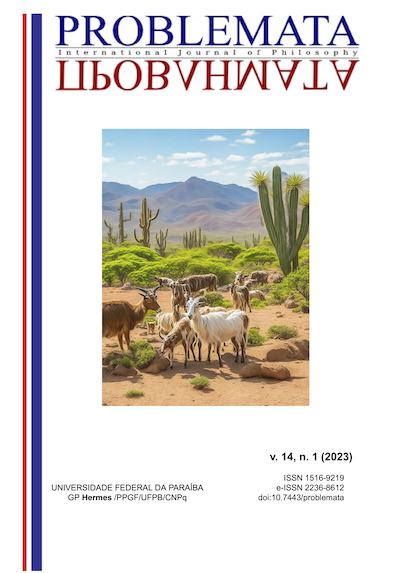IF THERE IS NO GOD, IS EVERYTHING ALLOWED?
BETWEEN DOSTOIEVSKI AND IMMANUEL KANT
DOI:
https://doi.org/10.7443/problemata.v14i1.65622Keywords:
Immanuel Kant, Dostoievski, God, Moral actAbstract
The present article intends to explore the maxim contained in The Brothers Karamazov (If there is no God, is everything allowed?) in the light of Immanuel Kant's thought. To do so, it uses Dostoevsky's thinking only to the extent that it helps us to present the idea of God and its relationship with the atheist's position. Keeping in mind the Kantian philosophy, we seek not only the presentation of this idea, but also its relationship with the moral act and with the very condition of this act. This, therefore, will result in Kant, a doubly negative answer to the question that reflects Ivan Karamazov's atheistic position. For Kant, by distinguishing the moral act by duty and according to duty, argues that resorting to something external to reason (God) would constitute a merely heteronomous will. Therefore, the moral act par excellence occurs when the action is performed in a way guided solely by reason, based on a pure interest, and this leads, in turn, to Kant's disapproval of the aforementioned maxim present in Dostoevsky's work.
Downloads
References
EVDOKIMOV, Paul. Dostoïevski et le problème du mal. Paris: Desclée de Brouwer, 1978.
DELEUZE, Gilles. A filosofia crítica de Kant. Tradução de Germiniano Franco. Lisboa: Edições 70, 2012.
DOSTOYEVSKI, Fiódor. Os irmãos Karamázov / Fiódor Dostoyevski ; tradução de Paulo Bezerra – São Paulo : Editora 34, 2012.
FICHTE, Johann Gottlieb. Versuch einer Kritik aller Offenbarung. Herausgegeben von Hansjürgen Verweyen, Philosophische Bibliothek 354. Mit Einleitung, Bibliographie, Anmerkungen und Register herausgegeben von Hansjürgen Verweyen. 1998.
KANT, Immanuel. (AAIV) Grundlegung zur Metaphysik der Sitten. In: Kants Werke. Ed. Königlich Preußischen Akademie der Wissenschaften, Berlin: Georg Reimer, 1912.
KANT, Immanuel. Kritik der praktischen Vernunft. In: Kants Werke. Ed. Königlich Preußischen Akademie der Wissenschaften, Berlin: Georg Reimer, 1912.
KANT, Immanuel. Die Religion innerhalb der Grenzen der bloßen Vernunft (AA 06). Mit einer Einleitung und Anmerkungen herausgegeben von Bettina Stangneth, Felix Meiner Verlag: Hamburg, 2003.
LÉON, Xavier. Fichte et son Temps I, Établissement et Prédication de la Doctrine de la Liberté. Librairie Armand Colin: Paris, 1992.
PAREYSON, Luigi. Filosofia, romanzo ed esperienza religiosa. Torino: G. Einaudi, 1993.
PERIUS, Oneide. Fiódor Dostoiévski e o Cristianismo. Fragmentos de Cultura, Goiânia, v. 28, n. 3, p. 413-421, 2018.
TILLICH, Paul. Teologia sistemática / Paul Tillich ; tradução Getúlio Bertelli e Geraldo Komdörfer. - São Leopoldo: Sinodal, 2005.
Downloads
Published
Issue
Section
License
Copyright (c) 2023 Guilherme Felipe Carvalho, Antônio Salomão Neto

This work is licensed under a Creative Commons Attribution 4.0 International License.
Authors who publish with this journal agree to the following terms:
- Authors retain copyright and grant the journal right of first publication with the work simultaneously licensed under a Creative Commons Attribution License that allows others to share the work with an acknowledgement of the work's authorship and initial publication in this journal.
- Authors are able to enter into separate, additional contractual arrangements for the non-exclusive distribution of the journal's published version of the work (e.g., post it to an institutional repository or publish it in a book), with an acknowledgement of its initial publication in this journal.
-
- Authors are permitted and encouraged to post their work online (e.g., in institutional repositories or on their website) prior to and during the submission process, as it can lead to productive exchanges, as well as earlier and greater citation of published work (See The Effect of Open Access).





